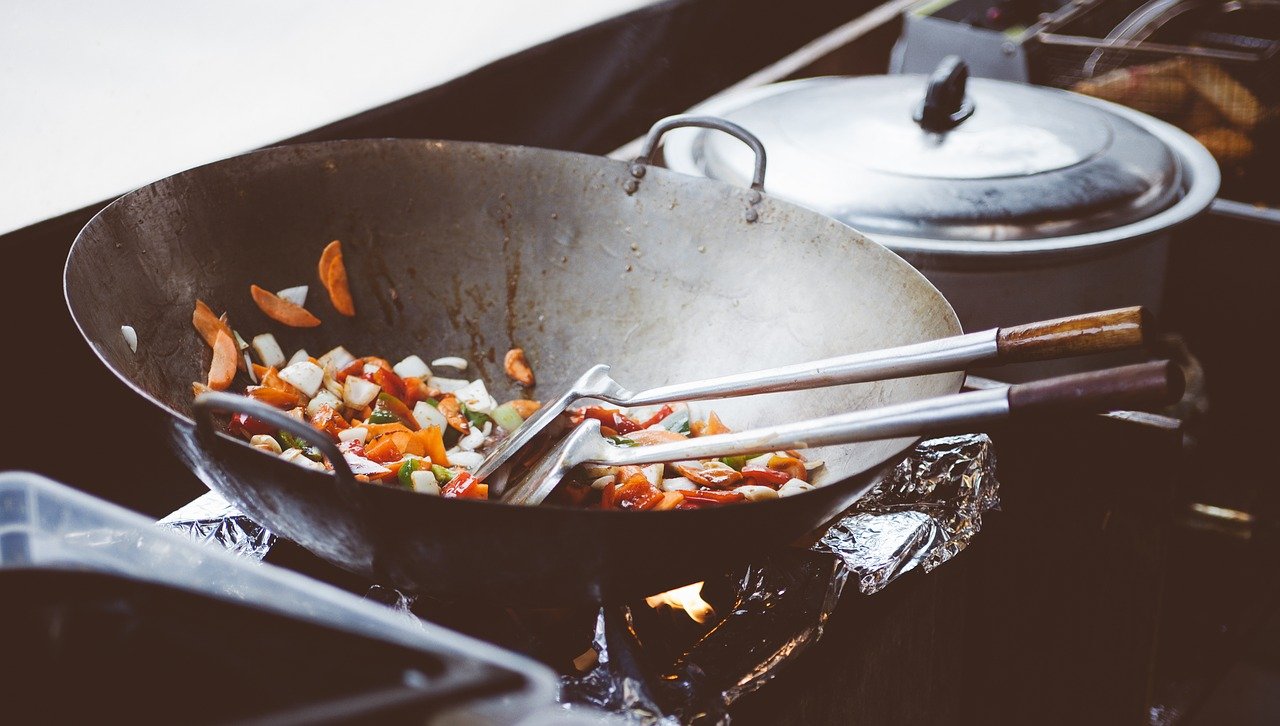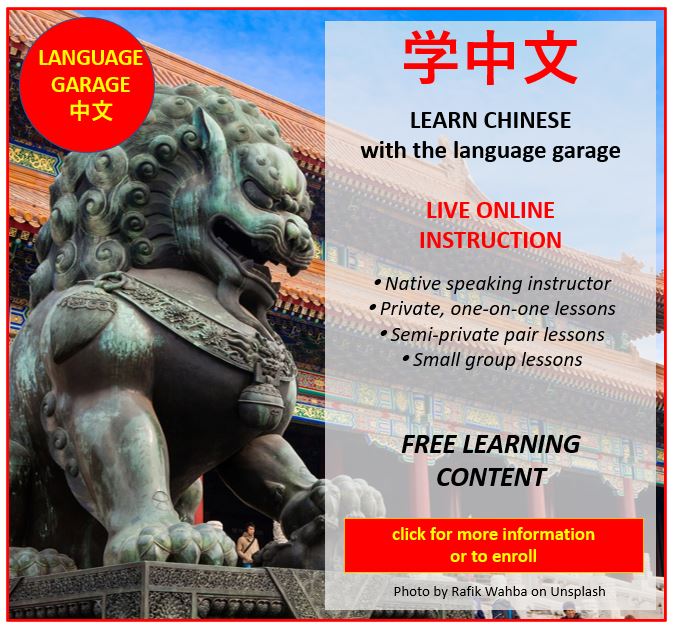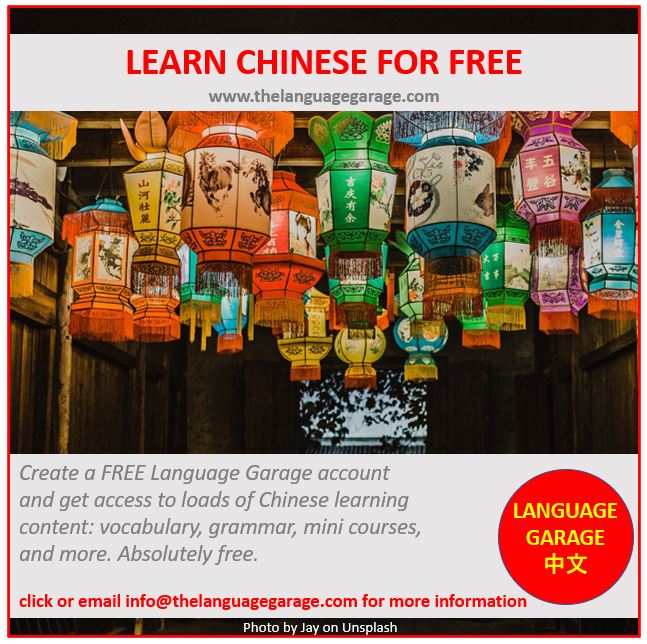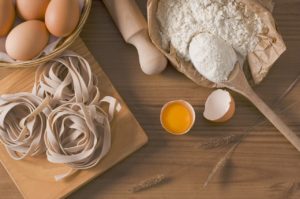If you’re learning Chinese, 食物 shíwù food is one of the things you’ll probably need to – or at least want to – talk about. So in this post, let’s dig in to some vocabulary for food, cooking, and meals.
我饿了!Wǒ è le! I’m hungry!
Let’s start with things you might want to say before you have something to eat or drink.
- 我饿了!
Wǒ è le!
I’m hungry. - 我饿死了!
Wǒ è sǐ le!
I’m starving!
- 我渴了!
Wǒ kě le!
I’m thirsty. - 我渴死了!
Wǒ kě sǐ le!
I’m dying of thirst! - 我想吃东西。
Wǒ xiǎng chī dōngxī.
I want something to eat. - 我想喝东西。
Wǒ xiǎng hē dōngxī.
I want something to drink. - 我想吃点心。
Wǒ xiǎng chī diǎnxīn.
I feel like a snack.
晚餐好了!Wǎncān hǎo le! Dinner is ready!
The meals in Chinese are 早餐zǎocān (breakfast), 午餐 wǔcān (lunch), and 晚餐 wǎncān (dinner). A snack is 点心 diǎnxīn.
- 早餐吃什么?
Zǎocān chī shénme?
What’s for breakfast? - 午餐吃什么?
Wǔcān chī shénme?
What’s for lunch? - 晚餐吃什么?
Wǎncān chī shénme?
What’s for dinner? - 点心吃什么?
Diǎnxīn chī shénme?
What’s for dessert? - 我吃早餐吃得早。
Wǒ chī zǎocān chī de zǎo.
I eat breakfast early. - 我和同事吃午餐。
Wǒ hé tóngshì chī wǔcān.
I eat lunch with colleagues. - 我和家人吃晚餐。
Wǒ hé jiārén chī wǎncān.
I eat dinner with my family.
在餐厅。Zài cāntīng. At a restaurant.
If you go to a restaurant, these expressions may come in handy.
- 一/两/三/四/五 位,谢谢。
yī / liǎng / sān / sì / wǔ wèi, xiè xie.
A table for one/two/three/four/five, please. - 你预约了吗?
Nǐ yùyuē le ma?
Do you have a reservation? - 我预约了。我们预约了。
Wǒ yùyuē le. Wǒmen yùyuē le.
I have a reservation. We have a reservation. - 我没预约。我们没预约。
Wǒ méi yùyuē. Wǒmen méi yùyuē.
I don’t have a reservation. We don’t have a reservation. - 你有菜单吗?
Nǐ yǒu càidān ma?
Do you have a menu? - 你有英文菜单吗?
Nǐ yǒu Yīngwén càidān ma?
Do you have a menu in English? - 你有酒单吗?
Nǐ yǒu jiǔdān ma?
Do you have a wine list? - 你准备好点餐了吗?
Nǐ zhǔnbèi hǎo diǎncān le ma?
Are you ready to order? - 我准备好点餐了。我们准备好点餐了。
Wǒ zhǔnbèi hǎo diǎncān le. Wǒmen zhǔnbèi hǎo diǎncān le.
I’m ready to order. We’re ready to order. - 我还没准备好点餐。我们还没准备好点餐。
Wǒ háiméi zhǔnbèi hǎo diǎncān. Wǒmen háiméi zhǔnbèi hǎo diǎncān.
I’m not ready to order. We’re not ready to order. - 请再给我们几分钟。
Qǐng zài gěi wǒmen jǐ fēnzhōng.
A few more minutes, please. - 你推荐什么?
Nǐ tuījiàn shénme?
What do you recommend? - 可以给我 餐巾纸/叉子/刀子/汤匙/筷子 吗?
Kěyǐ gěi wǒ cānjīnzhǐ / chāzi / dāozi / tāngshi / kuàizi ma?
Could I have a napkin/fork/knife/spoon/chopsticks? - 可以给我一杯水吗?
Kěyǐ gěi wǒ yìbēi shuǐ ma?
Could I have a glass of water? - 买单,谢谢。
Mǎidān, xiè xiè.
Check, please. - 哪里买单?
Nǎlǐ mǎidān?
Where do I pay?
我吃素。Wǒ chī sù. I’m vegetarian.
If you’re on any kind of restricted diet, you may need to know these helpful expressions before you order.
- 我节食中。
Wǒ jiéshí zhōng.
I’m on a diet. - 我吃素。我不吃肉或鱼。
Wǒ chī sù. Wǒ bùchī ròu huò yú.
I’m vegetarian. I don’t eat meat or fish. - 我吃全素。我不吃动物制品。
Wǒ chī quán sù. Wǒ bùchī dòngwù zhìpǐn.
I’m vegan. I don’t eat any animal products. - 我不吃肤质。
Wǒ bù chī fūzhì.
I don’t eat gluten. - 我对花生过敏。
Wǒ duì huāshēng guòmǐn.
I’m allergic to peanuts. - 我对奶制品过敏。
Wǒ duì nǎizhìpǐn guòmǐn.
I’m allergic to dairy products. - 我对坚果过敏。
Wǒ duì jiānguǒ guòmǐn.
I’m allergic to tree nuts. - 我对甲壳类海鲜过敏。
Wǒ duì jiǎkélèi hǎixiān guòmǐn.
I’m allergic to shellfish. - 我不喝有酒精的饮料。
Wǒ bù hē yǒu jiǔjīng de yǐnliào.
I don’t drink alcohol. - 我不喝有咖啡因的饮料。
Wǒ bù hē yǒu kāfēiyīn de yǐnliào.
I don’t drink caffeine. - 这是犹太食品认证的食物吗?
Zhèshì yóutài shípǐn rènzhèng de shíwù ma?
Is this food kosher? - 这是清真认证的食物吗?
Zhèshì qīngzhēn rènzhèng de shíwù ma?
Is this food halal?
别太辣。Bié tài là. Not too spicy.
People can tolerate different levels of heat in their food, so you may want to say:
- 这个辣吗?
Zhège là ma?
Is this spicy? - 我喜欢吃辣。
Wǒ xǐhuān chī là.
I like spicy food. - 我不吃辣。
Wǒ bù chī là.
I don’t like spicy food. - 最辣,谢谢。
Zuìlà, xiè xiè.
Very spicy, please. - 中辣,谢谢。
Zhōnglà, xiè xiè.
Medium spicy, please. - 不辣,谢谢。
Búlà, xiè xiè.
Not spicy, please. - 这太辣了。
Zhè tài là le.
It’s too spicy.
你的菜怎么样?Nǐ de cài zěnmeyàng? How’s your food?
The four basic tastes are 咸的xián de (salty), 甜的tián de (sweet), 苦的kǔ de (bitter), 酸的suān de (sour). But if someone asks how your food is, you’ll probably want know a bit more than that.
- 很好吃。
Hěn hǎo chī.
It’s delicious. - 很棒。
Hěn bàng.
It’s great. - 菜非常美味。
Cài fēi cháng měi wèi.
This food is excellent. - 太辣了。
Tài là le.
It’s too hot. - 太冷了。
Tài lěng le.
It’s too cold. - 太甜了。
Tài tián le.
It’s too sweet. - 太咸了。
Tài xián le.
It’s too salty. - 没有味道。
Méi yǒu wèi dào.
It’s tasteless/bland. - 煮太久了。
Zhǔ tài jiǔ le.
It’s overcooked. - 没煮熟。
Méi zhǔ shú.
It’s undercooked. - 太油了。
Tài yóu le.
It’s oily/greasy.
我喜欢煮菜。Wǒ xǐhuān zhǔcài. I like to cook.
Sometimes, it’s nice to stay in and cook, especially if 你是很好的厨师。Nǐ shì hěnhǎo de chúshī. (You’re a good cook.) Here are some basic vocabulary and expressions for cooking.
- 我要煮晚餐了。
Wǒ yào zhǔ wǎncān le.
I’m going to cook dinner. - 这个食谱很 容易/ 难。
Zhège shípǔ hěn róngyì / nán.
This is an easy/hard recipe. - 我需要买这些材料。
Wǒ xūyào mǎi zhèxiē cáiliào.
I need to buy the ingredients. - 我在煮滚水。
Wǒ zài zhǔ gǔn shuǐ.
I’m boiling water. - 我在煮 饭/意大利面/马铃薯。
Wǒ zài zhǔ fàn / yì dà lì miàn / mǎ líng shǔ.
I’m cooking rice/pasta/potatoes. - 我在炸 蔬菜/鸡/鱼。
Wǒ zài zhà shūcài / jī / yú.
I’m frying vegetables/chicken/fish. - 我在烤 面包/饼干/蛋糕。
Wǒ zài kǎo miànbāo / bǐnggàn / dàngāo.
I’m baking bread/cookies/a cake. - 我在烤 羊肉/鸡肉/牛肉。
Wǒ zài kǎo yángròu / jīròu / niúròu.
I’m roasting lamb/chicken/beef. - 我在烤 鱼/鸡/蔬菜。
Wǒ zài kǎo yú / jī / shūcài.
I’m grilling fish/chicken/vegetables. - 我把材料混合在一起。
Wǒ bǎ cáiliào hùnhé zài yīqǐ.
I’m mixing the ingredients. - 我把酱料搅拌在一起。
Wǒ bǎ jiàngliào jiǎobàn zài yīqǐ.
I’m stirring the sauce. - 我加 盐/糖/水/香草/香料。
Wǒ jiā yán / táng / shuǐ / xiāngcǎo / xiāngliào.
I’m adding salt/sugar/water/herbs/spices.
请享用!Qǐng xiǎng yòng! Enjoy your meal!
Do you want to learn Chinese?
Check out our other posts on Chinese language, culture, and more. And if you’re looking for convenient and affordable live Chinese lessons with a real teacher, check out The Language Garage. Our lessons are given online in a virtual classroom, so it doesn’t matter where you live or work – we can come to you. And we have flexible options, with a free trial so that you can decide if there’s a fit. Check us out!






